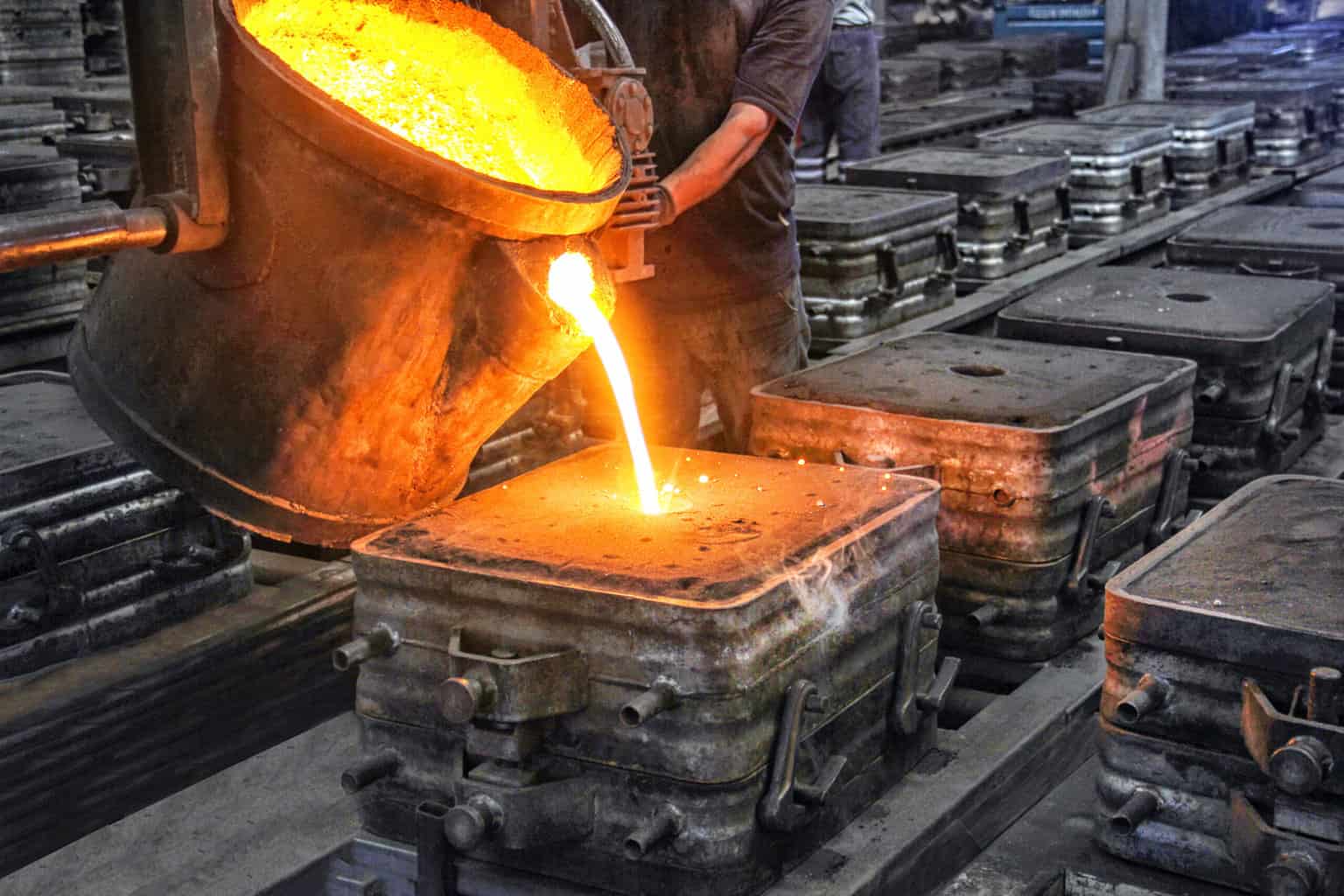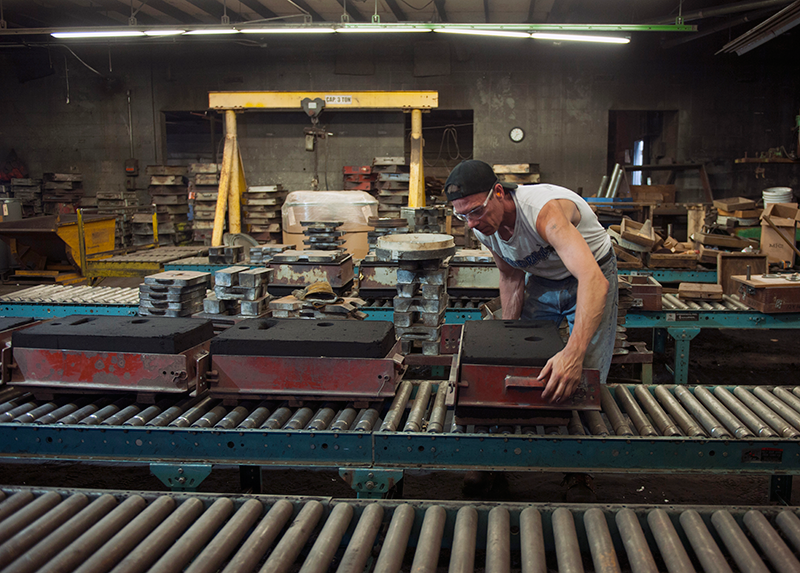What Makes a Casting Foundry Environmentally Responsible?
Discovering the Necessary Function of Casting Foundry in Modern Manufacturing
Casting shops are crucial in contemporary production, providing important components throughout diverse sectors. Casting Foundry. Their capability to create intricate, light-weight components satisfies the growing needs for effectiveness and high quality. However, the landscape is progressing, influenced by technical advancements and sustainability worries. As these foundries navigate opportunities and difficulties, their future role in production remains unpredictable. What approaches will they utilize to adjust and prosper in this vibrant atmosphere?
The Principles of Spreading: Comprehending the Refine
Although Casting has been a basic manufacturing procedure for centuries, its principles stay essential to modern-day industry. This procedure entails pouring a liquid product, commonly metal, right into a mold to create a particular form. The mold and mildew is developed to form the preferred final result, which strengthens as it cools down. Trick stages in casting include pattern making, mold and mildew creation, pouring, and finishing. Each phase calls for mindful focus to detail, making sure that the end product meets quality and dimensional requirements.
The flexibility of Casting enables for the production of complicated geometries that would certainly be difficult or tough to accomplish via various other making approaches. Additionally, Casting can suit a selection of products, consisting of polymers and metals. This versatility makes it a vital method for markets ranging from automobile to aerospace, supporting development and efficiency in the creation of components that fulfill the needs of contemporary applications.
Types of Casting Techniques and Their Applications
Casting techniques are varied, each tailored for particular applications and material requirements. Sand Casting is just one of the oldest techniques, appropriate for complicated geometries and big components, utilizing sand mold and mildews. Investment spreading, recognized for its accuracy, is optimal for complex designs and is frequently made use of in aerospace and medical markets. Pass away spreading, usually used for high-volume manufacturing, enables for rapid manufacturing of smaller sized components with good surface area finish, typically in light weight aluminum or zinc alloys. Covering Casting supplies an equilibrium in between both, giving fine details and excellent toughness, making it prominent in automotive applications. Long-term mold and mildew casting, used for non-ferrous steels, delivers a tighter dimensional resistance and far better mechanical residential or commercial properties. Finally, centrifugal Casting is reliable for creating cylindrical elements, commonly discovered in pipes and tubes - Casting Foundry. Each method offers distinct purposes, highlighting the convenience and relevance of Casting in modern production
The Influence of Casting Shops on Sector Technology
As industries undertaking for greater efficiency and product quality, the duty of casting shops comes to be significantly crucial in driving innovation. These centers work as the foundation for producing complicated elements throughout various markets, including automobile, aerospace, and power. By leveraging innovative Casting strategies and products, shops add to the development of lighter, stronger, and much more long lasting products that meet advancing customer needs.

Furthermore, foundries assist in using sustainable methods, such as recycling steel and reducing waste, which aligns with contemporary market criteria for environmental obligation. Inevitably, the innovative abilities of casting factories not just boost manufacturing efficiency however likewise propel entire markets into a future characterized by technical advancement and sustainability.

Challenges Facing Casting Shops in a Modern Economic situation
While technology remains to reshape the production landscape, casting foundries encounter a myriad of obstacles that intimidate their operational feasibility. One considerable problem is the boosting competition from innovative production technologies, such as additive manufacturing, which can generate complicated get rid of much less material waste. Furthermore, the fluctuating costs of resources, specifically metals, pose financial threats, impacting cost predictability. Labor lacks even more exacerbate these difficulties, as proficient employees end up being harder to why not look here preserve and find in the middle of an aging labor force. Furthermore, governing pressures concerning emissions and office safety call for factories to invest in costly upgrades, usually stressing restricted resources. The requirement for electronic transformation likewise impends huge, as many foundries struggle to take on Market 4.0 modern technologies that improve efficiency and information administration. Jointly, these obstacles urge casting shops to adapt quickly or take the chance of obsolescence in an increasingly open market.
Sustainability Practices in Casting Foundries
Among the challenges confronting Casting foundries, the adoption of sustainability methods has actually become an important method for boosting functional strength and competition. Foundries are increasingly concentrating on minimizing waste with effective source monitoring, reusing scrap steel, and using green products in their procedures. The implementation of energy-efficient technologies is an additional important element, as it helps lower energy consumption and carbon discharges.
Additionally, lots of shops are embracing closed-loop systems to lessen water use and minimize the environmental impact of operations. Employee training in sustainable methods promotes a culture of ecological obligation, making certain that all group participants are taken part in sustainability campaigns.
Integrating Modern Technology in Casting Processes
Incorporating sophisticated technologies right into casting procedures has come to be an essential element in driving effectiveness and development within foundries. Automation and robotics are significantly utilized to improve manufacturing, minimizing labor costs and decreasing human error. Advanced software for simulation and modeling permits engineers to visite site forecast results and maximize styles prior to physical production starts. Furthermore, the incorporation of 3D printing modern technology considerably boosts the prototyping stage, facilitating quick development and lowering lead times.
In enhancement, real-time monitoring systems using IoT gadgets make it possible for factories to track efficiency metrics and identify potential concerns early in the Casting process. This data-driven technique not just enhances top quality control but likewise sustains maintenance techniques that prevent expensive downtimes. Because of this, integrating these innovations cultivates a more active production environment, enabling factories to react promptly to market needs while maintaining high criteria of quality and sustainability.
The Future of Casting Foundries in Production

Additionally, the demand for high-performance and lightweight products in markets like aerospace and automobile will certainly drive development within factories. Cooperations in between producers and shops will likely raise, fostering an extra integrated supply chain that highlights quick prototyping and modification. As electronic find this makeover continues, factories might likewise utilize data analytics to enhance procedures and predict upkeep demands, guaranteeing competition. Ultimately, the future of casting shops depends upon their ability to adjust to technical innovations and market demands while keeping quality and cost-effectiveness.
Often Asked Concerns
What Materials Are Frequently Used in Casting Foundries?
The materials frequently made use of in casting foundries include steels such as aluminum, bronze, steel, and iron, along with different alloys. Furthermore, sand, material, and ceramic are usually utilized for mold and mildews and core manufacturing.
Exactly How Do Casting Factories Make Certain Top Quality Control in Production?
Casting factories carry out extensive quality assurance measures, including routine examinations, standard screening, and adherence to market qualifications. These techniques assure that each product meets specified resistances and efficiency criteria, consequently maintaining high levels of reliability and customer satisfaction.
What Are the Security Measures in Casting Foundries?
Safety and security actions in casting foundries include using individual safety devices, appropriate air flow systems, normal tools maintenance, staff member training programs, and adherence to safety and security guidelines to minimize hazards connected with molten steel handling and machinery procedure.
How much time Does the Casting Refine Commonly Take?
The Casting process normally takes a number of hours to several days, depending on factors such as the intricacy of the style, the products made use of, and the cooling time required for the cast elements to solidify appropriately.
What Is the Role of Designers in Casting Foundries?
Engineers in casting foundries oversee layout, process optimization, and top quality control. They ensure that materials satisfy requirements, troubleshoot manufacturing issues, and implement innovative techniques, eventually adding to efficiency and the effective fabrication of metal components.
Casting shops are crucial in contemporary production, providing vital parts across diverse markets. While innovation continues to improve the production landscape, casting foundries face a myriad of difficulties that endanger their functional practicality. Amidst the challenges confronting Casting shops, the adoption of sustainability practices has arised as an important method for boosting operational durability and competitiveness. In enhancement, real-time surveillance systems using IoT devices allow factories to track performance metrics and determine possible concerns early in the Casting procedure. The products generally made use of in casting shops include metals such as aluminum, iron, bronze, and steel, along with numerous alloys.